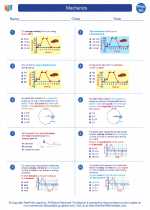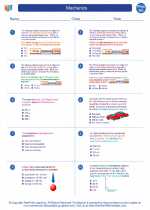Weight
Weight is a measure of the force of gravity acting on an object. It is a vector quantity, which means it has both magnitude and direction. The weight of an object is directly proportional to the force of gravity acting on it.
Formula for Weight
The weight of an object can be calculated using the formula:
Weight (W) = mass (m) × acceleration due to gravity (g)
Units of Weight
In the International System of Units (SI), weight is measured in newtons (N). In the customary system, weight is measured in pounds (lb).
Differences between Weight and Mass
It's important to note that weight and mass are not the same thing. Mass is a measure of the amount of matter in an object and is a scalar quantity. Weight, on the other hand, is the force exerted on an object due to gravity and is a vector quantity. The mass of an object remains constant regardless of its location, while weight can vary depending on the strength of the gravitational field.
Study Guide:
- Understand the concept of weight as a force and its relationship to gravity.
- Learn the formula for calculating weight and how to use it in problems.
- Be able to differentiate between weight and mass, and understand their respective units of measurement.
- Practice solving problems involving weight, mass, and gravity, including converting between different units of measurement.
- Explore real-world applications of weight and gravity, such as in engineering, sports, and space exploration.
Remember to always pay attention to the direction of the weight when working with vector quantities.
.


